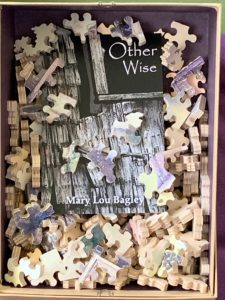FROM – OTHER WISE, A NOVEL
“Saw Margaret in town today,” Uncle Otis says. “Told me to get that right rear tire fixed ‘fore I end up in the creek.”
“You gonna’ fix it?” Uncle Merton asks.
“Damn right!
Long silence.
“There’s a right puzzler for you,” Mert says.
“Yup. Never seen anyone like her.”
“Always at least three jigsaws going. Once when I was out there upgrading her electrical service, she finished out one of the big ones only to find a piece missin’. I woulda’ exploded, been me. But not her. Just said, ‘Well, what do you know. I been looking for the one with the yellow tip and it was among the missing all along.’ And she just moved on to the card table in the corner where she had a big round one going.
“When she saw me gawpin’ at it, she says, ‘This one’s a matter of finding the piece with the umpteenth gradation of black.’ And she laughs that laugh of hers. … Some say she’s a couple of pieces shy of a jigsaw herself.”
“Some say worse. Jacob Pill swears it’s the evil eye she’s got. Typical Jacob,” Otis says. “She just sees things differently from the rest of us.”
“Not only sees things differently. Sees different things than the rest of us!” Mert laughs.
FROM – THIS OTHER WAY OF KNOWING, book II
At the kitchen table, a steaming cup of tea before her, Margaret opens the journal. On the inside cover the name Lucinda Hamilton Meader is written in a delicate upright script, no slant. Almost childlike, yet radiating a quiet strength.
… Margaret turns the page.
I’ve always had the dreams.
She sits back in the chair, tears welling. She breathes in the words again. I’ve always had the dreams. This simple statement reaches into the deepest part of her being and touches a place she’s never dared acknowledge. … She wipes her eyes and reads on.
Sometimes they filter in as I sleep and burble up when I wake. Other times the one called the Shepherdess ushers them in.
One time when I was little, She brought the same dream night after night. With a rustling on fabric, She swept into my room, draped in a mourning cloak. She bent low and spread the scene before me with a wave of her shepherd’s crook … I felt the deep rumbling before I saw it. The terrible flash flood. Not of water, but moving just as fast. A dark viscous something. Screaming people running out ahead. Some not fast enough. An overpowering smell stinging my nostrils. Burnt sugar. Beyond burnt …
Then two nights with no dreams at all.
And then it happened.
FROM – “NEED DEEP” (Out of the Dark)
It wasn’t until I was seven that I heard someone refer to Nana’s dolls as “healing dolls” and to Nana as a “healer.”…
… When I was five, I remember asking her to make me a doll to play with like the one she was working on. Her fingers went quiet, hands coming to rest. The grandfather clock in the hall ticked. She lowered her chin to look at me over the tops of her glasses and said, “They spring from need and not from want or wish, Sweet Pea.”
FROM – “CIRCLE OF LEAST CONFUSION” (out of the Dark)
Everyone calls me Crazy Caroline. It used to make me want to cry. But not anymore. Now I don’t care.
Aunt Polly and Mrs. Klinka and Mrs. Lemons and Mrs. Juices tell me it’s okay to cry. They say it’s okay to care too. But I don’t. Let everyone laugh and make fun and call me Crazy Caroline if they want to. It’s not sticks and it’s not stones and they can’t break me because I don’t care.
FROM – “THE VIRGINIA GRACE” (Out of the Dark)
She thought she was alone in the house, of course, and I knew I should have left her be. I should have gone down the back stairs and out the kitchen door to my tree house. I should have. But I didn’t. I couldn’t help myself.
I settled on the stair landing and watched through the spindles of the mahogany banister. I breathed in the oily lemon smell of polished wood and the sicky sweetness of fat white candles burning on the mantelpiece below me in the darkened parlor where the shades were pulled, the drapes drawn. …
… there I sat in shocked silence, choosing not to tell Aunt Virginia Grace that I was home.
FROM – “BEYOND THE PALE” (Out of the Dark)
Nancy had seen the flamboyant woman often enough in the halls and lunch room at work, but had never met her. …
…So Nancy looked upon this caricature of a woman with amused indulgence. Poor thing, she thought, always calling attention to herself. Knows no better, of course. Hasn’t been taught that “less is more.”
Then came the day on the bench in the wind.
FROM – “TURNABOUT” (Twin Farms Anthology)
Everyone called him Fester. Not because his name was really Lester and it rhymed. Though it was and it did. And not because his little sister, inclined to chew on her bottom lip, called him “Fester” and got away with it because her cheeks were baby round. Though she did and they were. And not because his initials were L. F. and when he wrote his name, the loop of his F sliced back across the L. Though they were and it did.
No, everyone called him Fester because they decided early on that it best fit his response to the world.


